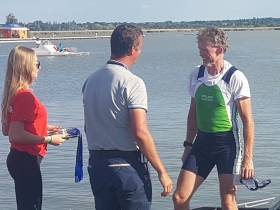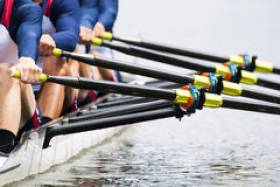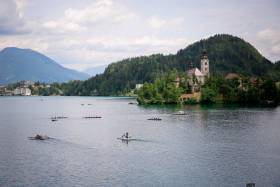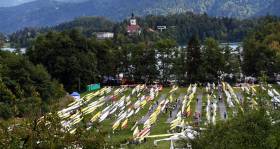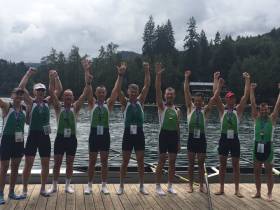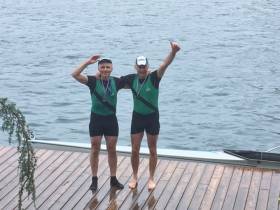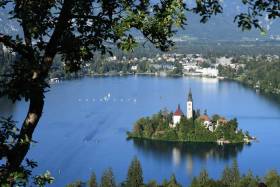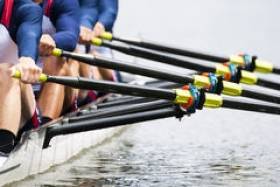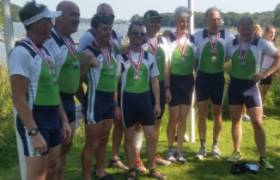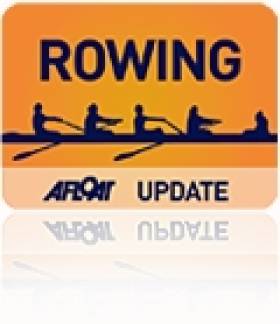Displaying items by tag: World Masters
Crowley Leads Ireland to More Masters Wins in Hungary
#Rowing: Irish crews added four more wins to their haul over the weekend at the World Masters Regatta at Lake Velence in Hungary. The wins came on Saturday. Denis Crowley featured in a composite eight, which beat strong British opposition, and in a four – bringing his personal tally to eight wins. Brendan Smyth and Patrick Fowler of Commercial won in the double and Milo and Pat Murray of Cappoquin won the in the pair. A mixed eight finished second on Sunday.
World Masters Regatta, Lake Velence, Hungary (Selected Results; Irish interest; Winners)
Saturday
Men
Eight (E – avg 55 or more): Galway, Belfast BC, Neptune, Clonmel, Commercial, Shannon (G Murphy, A McCallion, K McDonald, D Crowley, F O’Toole, O McGrath, G O’Neill, C Hunter, M McGlynn) 3:04.90
Four (D – avg 50 or more): Commercial, Neptune (B Smyth, F O’Toole, G Murphy, D Crowley) 3:24.72.
Pair (F – avg 60 or more): Cappoquin (P Murray, M Murray) 6:12.10.
Sculling, Double (C – avg 43 or more): Commercial (B Smyth, F Fowler) 3:28.39.
Irish Composite Crews Lead the Way at World Masters
#Rowing: A composite of five crews – Galway, Neptune, Commercial, Clonmel and Cork – won in the men’s eight for 50 and over at the World Masters Regatta in Budapest. It was one of a sequence of wins for the Irish at the huge event.
Brendan Smyth and Patrick Fowler, rowing for Commercial, won the Pair in the A class, while Denis Crowley and Tony Corcoran won in single sculls.
Two C fours (43 or more) won and an E coxed four (55 or more) also took the honours.
World Masters Regatta, Budapest, (Selected Results, Irish interest, winners)
Wednesday
Men
Four, coxed E (55 or more) – Heat Four: 1 Belfast BC, Commercial, Galway, Leichhardt RC (C Hunter, A McCallion, M Heavey, G Canning; cox: JM Marks) 8:05.40
Thursday
Men
Eight (D – 50 or more) – Heat Two: Galway, Neptune, Commercial, Clonmel, Cork (B Crean, B Smyth, R Caroll, O McGrath, G O’Neill, P Fowler, D Crowley, G Murphy; cox: M McGlynn) 3:05.06.
Four (C – 43 or more): Heat Three: Commercial, Galway, Clonmel, Neptune (R Carroll, O McGrath, P Fowler, G O’Neill) 3:15.28. Heat Six: Commercial/Neptune (D Smyth, F O’Toole, G Murphy, D Crowley) 3:15.54.
Pair (A – 27 or more): Heat Three: Commercial (P Fowler, B Smyth) 3:32.68
Sculling, Single – (D – 50 or more) – Heat 15: Commercial (D Crowley) 3:55.15.
(H – 70 or more) – Heat Eight: 1 T Corcoran 4:27.08.
Four and Pair add to Irish Tally at World Masters
#Rowing: The C coxed four of Rob Forde, Patrick Fowler, Oisin McGrath, Gary O’Neill and Tony Corcoran won their heat. The Commercial, Clonmel and Neptune crew beat a Monmouth crew from Britain by almost two seconds.
Milo and Patrick Murray from Cappoquin brought Ireland’s win tally on the day to three when they won in the F Pair.
Earlier an Irish composite eight had won in the E class.
World Masters Regatta, Bled, Slovenia, Day Four (Selected Results; Irish interest; all heats of 1,000 metres, winners only)
Men
Eight ‘E’ (Avg 55 or more) – Heat Three: Waterford, Neptune, Commercial, Belfast BC (A Penkert, J Hudson, D Crowley, G Murphy, M Heavey, C Dickson, C Hunter, F O’Toole, D McGuinness) 3:07.88.
Four, coxed ‘C’ (Avg 43 or more) – Heat Four: Commercial, Clonmel, Neptune (T Corcoran, R Forde, P Fowler, O McGrath, G O’Neill) 3:19.51.
Pair ‘F’ (Avg 60 or more) – Heat Five: Cappoquin (P Murray, M Murray) 3:46.64.
Sweet Win For Irish Composite Eight at World Masters
#Rowing: One of the leading Irish boats at the World Masters Regatta in Bled in Slovenia clocked up a notable win today. The E eight made up of competitors from Belfast Boat Club, Commercial, Neptune and Waterford beat Dynamo of Russia, who have been their constant rivals of recent years. The margin was extremely tight – just .26 of a second.
World Masters Regatta, Bled, Slovenia, Day Four
Men
Eight ‘E’ (Avg 55 or more) – Heat Three: Waterford, Neptune, Commercial, Belfast BC (A Penkert, J Hudson, D Crowley, G Murphy, M Heavey, C Dickson, C Hunter, F O’Toole, D McGuinness) 3:07.88.
Crowley Hits the Mark Twice as Irish Amass Masters Wins
#Rowing: Irish crews continued to amass medals on the second day of the World Masters Regatta in Bled in Slovenia. The composite eight from Galway, Commercial, Clonmel, Neptune and Cork had a fine win in a good time of just over three minutes for the 1,000 metres. Denis Crowley won in both the E and C age groups in the single sculls and two composite fours won.
World Masters Regatta, Bled, Slovenia, Day Three (Selected Results; Irish interest; all heats of 1,000 metres, winners only)
Men
Eight ‘C’ (Avg age 43 or more) – Heat Nine: Galway, Commercial, Clonmel, Neptune, Cork (M McGlynn, R Forde, P Fowler, A McCallion, C Moloney, O McGrath, G O’Neill, B Smyth, B Crean) 3:00.35.
Four ‘D’ (Avg 50 or more): Commercial, Clonmel, Neptune (A Penkert, B Smyth, M Heavey, O McGrath, J Hudson) 3:23.86.
Four ‘E’ (Avg 55 or more) – Heat One: Commercial, Belfast BC (F O’Toole, C Hunter, C Dickson, D McGuinness) 3:20.25.
Sculling, Single - ‘E’ (55 or more)– Heat Three: Commercial (D Crowley) 3:49.40. C (43 or more) – Heat 23: Commercial (Crowley) 3:45.30
Irish Scullers, Pair and Four Win at World Masters
#Rowing: Two Irish scullers, a four and a pair led the Irish charge at the World Masters Regatta in Bled in Slovenia today. Denis Crowley of Commercial and Sean Heaney of Galway joined John Hudson and Gerry Murphy of Neptune as medal winners. The four of Rob Forde, Patrick Fowler, Oisin McGrath and Gary O’Neill also won – but after being adjudged late in the heat they had entered. They were moved into another heat, and came out on top there.
Three Irish eights just missed out, taking second place in their heats.
World Masters Regatta, Bled, Slovenia, Day Two (Selected Results; Irish interest; all heats of 1,000 metres, winners only)
Men
Four ‘C’ (avg age 43 or more) – Heat Five: Commercial, Clonmel, Neptune (R Forde, P Fowler, O McGrath, G O’Neill) 3:18.46.
Pair ‘E’ (avg 55 or more) – Heat Six: Neptune (J Hudson, G Murphy) 3:41.11.
Sculling, Single ‘D’ (50 or more) – Heat 11: Galway RC (S Heaney) 3:50.17. Heat 16: Commercial (D Crowley) 3:48.93.
Irish Crews Win at World Masters Regatta
#Rowing: Irish composite crews had good wins on the first day of the World Masters Regatta in Bled in Slovenia. The Irish B eight (average age 36 or more), which is formed from six clubs won. Two fours in the E class (average age 55 or more) also won – the Galway/Neptune combination by just .26 of a second. The decision was initially given to their German opponents.
World Masters Regatta, Bled, Slovenia, Day One (Selected Results; Irish interest; all heats of 1,000 metres, winners only)
Men
Eight, B (avg 36 or more) – Heat Five: Galway, Commercial, Shandon, Clonmel, Neptune, Cork 3:05.51.
Four, E (avg 55 or more) – Heat One: Galway, Neptune 3:26.26.
Heat Four: Waterford, Neptune, Commercial, Belfast BC 3:28.1
Ireland Crews Win at World Masters Rowing
#Rowing: Irish crews were amongst the winners again at the World Masters Regatta in Denmark today. Denis Crowley of Commercial and Niall O’Brien of Carlow won in the men’s single sculls for competitors 50 years or more and the Belfast Boat Club women’s coxed four (average age 60 or more) also won.
World Masters Regatta, Copenhagen (Irish interest - Winners; 1,000m)
Men
Single Sculls - D (average age 50 years or more) - Heat Two: Carlow Rowing Club (N O’Brien) 3:58.63. Heat 10: Commercial (D Crowley) 4:08.63.
Women
Four, coxed - F (average age 60 years or more) - Heat One: Belfast Boat Club 4:42.79.
Ireland Eight and Pair Win at World Masters Rowing
#Rowing: Ireland had two winners on the first day of the World Masters Rowing Championships in Denmark today. The Ireland composite eight won its race in the E (average age 55 or more) category. They beat German, British, Ukranian, Lithuanian and Turkish crews. The Ireland eight was drawn from Neptune, Commercial, Old Collegians and Belfast Boat Club.
Fran O’Toole and Donal McGuinness, who were part of that crew, won their pairs race in the D category (average age 50 or more).
World Masters Regatta, Copenhagen (Irish interest - Winners; 1,000m)
Men
Eight - E (avg age 55 or more) - Heat Two: Neptune, Commercial, Old Collegians, Belfast Boat Club (J Hudson, D Crowley, G Murphy, M Heavey, D Dickson, C Hunter, F O’Toole, D McGuinness; A Penkert) 3:04.93.
Pair - D (avg age 50 or more) - Heat Three: Commercial (F O’Toole, D McGuinness) 3:26.1.
Commercial Hit Mark At World Masters Rowing
#MastersRowing: Commercial had a good weekend at the World Masters Regatta in Varese in Italy. The Dublin club had a number of wins. Each heat winner receives a medal at the regatta, which had a massive entry of more than 3,000.
World Masters Regatta, Varese, Italy (Selected Results; Irish interest) All Heat Winners Medal:
Thursday: Eights ‘D’: 1 Commercial/Cappoquin/Old Collegians. Single Sculls ‘C’: 1 Commercial; 2 Commercial.
Friday: Women’s Four, coxed ‘E’: 2 Belfast Boat Club. Pair ‘D’: 1 Commercial; 2 Cappoquin. Single Sculls ‘A’: 2 Commercial.
Saturday: Pair ‘E’; 1 Drummoyne (Australia)/Belfast Boat Club; 2 Cappoquin. ‘B’: 2 Commercial; 3 Commercial.
Sunday: Pair ‘C’: 1 Commercial. Single Sculls ‘D’: 3 Commercial.


























